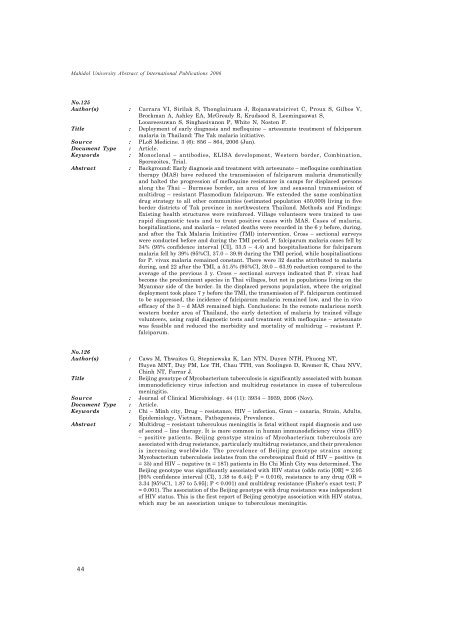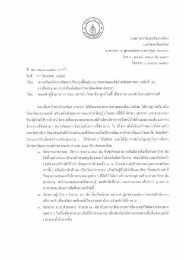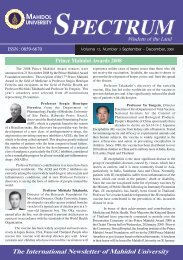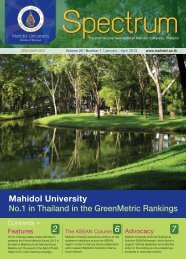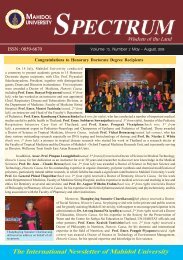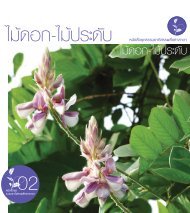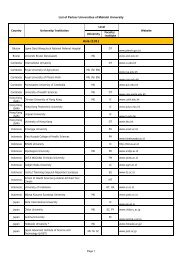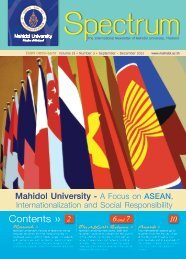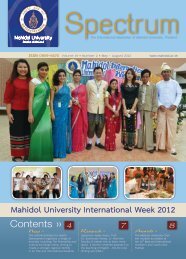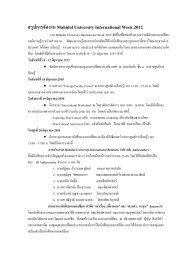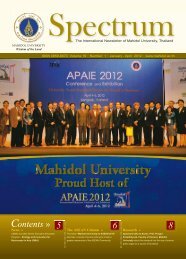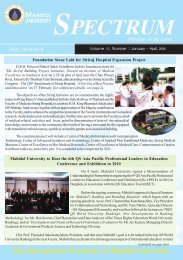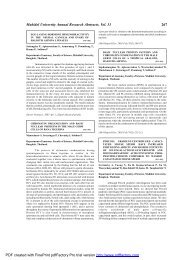2006 ที่น้องแอนทำ.pmd - Mahidol University
2006 ที่น้องแอนทำ.pmd - Mahidol University
2006 ที่น้องแอนทำ.pmd - Mahidol University
Create successful ePaper yourself
Turn your PDF publications into a flip-book with our unique Google optimized e-Paper software.
<strong>Mahidol</strong> <strong>University</strong> Abstract of International Publications <strong>2006</strong><br />
No.125<br />
Author(s) : Carrara VI, Sirilak S, Thonglairuam J, Rojanawatsirivet C, Proux S, Gilbos V,<br />
Brockman A, Ashley EA, McGready R, Krudsood S, Leemingsawat S,<br />
Looareesuwan S, Singhasivanon P, White N, Nosten F.<br />
Title : Deployment of early diagnosis and mefloquine – artesunate treatment of falciparum<br />
malaria in Thailand: The Tak malaria initiative.<br />
Source : PLoS Medicine. 3 (6): 856 – 864, <strong>2006</strong> (Jun).<br />
Document Type : Article.<br />
Keywords : Monoclonal – antibodies, ELISA development, Western border, Combination,<br />
Sporozoites, Trial.<br />
Abstract : Background: Early diagnosis and treatment with artesunate – mefloquine combination<br />
therapy (MAS) have reduced the transmission of falciparum malaria dramatically<br />
and halted the progression of mefloquine resistance in camps for displaced persons<br />
along the Thai – Burmese border, an area of low and seasonal transmission of<br />
multidrug – resistant Plasmodium falciparum. We extended the same combination<br />
drug strategy to all other communities (estimated population 450,000) living in five<br />
border districts of Tak province in northwestern Thailand. Methods and Findings:<br />
Existing health structures were reinforced. Village volunteers were trained to use<br />
rapid diagnostic tests and to treat positive cases with MAS. Cases of malaria,<br />
hospitalizations, and malaria – related deaths were recorded in the 6 y before, during,<br />
and after the Tak Malaria Initiative (TMI) intervention. Cross – sectional surveys<br />
were conducted before and during the TMI period. P. falciparum malaria cases fell by<br />
34% (95% confidence interval [CI], 33.5 – 4.4) and hospitalisations for falciparum<br />
malaria fell by 39% (95%CI, 37.0 – 39.9) during the TMI period, while hospitalisations<br />
for P. vivax malaria remained constant. There were 32 deaths attributed to malaria<br />
during, and 22 after the TMI, a 51.5% (95%CI, 39.0 – 63.9) reduction compared to the<br />
average of the previous 3 y. Cross – sectional surveys indicated that P. vivax had<br />
become the predominant species in Thai villages, but not in populations living on the<br />
Myanmar side of the border. In the displaced persons population, where the original<br />
deployment took place 7 y before the TMI, the transmission of P. falciparum continued<br />
to be suppressed, the incidence of falciparum malaria remained low, and the in vivo<br />
efficacy of the 3 – d MAS remained high. Conclusions: In the remote malarious north<br />
western border area of Thailand, the early detection of malaria by trained village<br />
volunteers, using rapid diagnostic tests and treatment with mefloquine – artesunate<br />
was feasible and reduced the morbidity and mortality of multidrug – resistant P.<br />
falciparum.<br />
No.126<br />
Author(s) : Caws M, Thwaites G, Stepniewska K, Lan NTN, Duyen NTH, Phuong NT,<br />
Huyen MNT, Duy PM, Loc TH, Chau TTH, van Soolingen D, Kremer K, Chau NVV,<br />
Chinh NT, Farrar J.<br />
Title : Beijing genotype of Mycobacterium tuberculosis is significantly associated with human<br />
immunodeficiency virus infection and multidrug resistance in cases of tuberculous<br />
meningitis.<br />
Source : Journal of Clinical Microbiology. 44 (11): 3934 – 3939, <strong>2006</strong> (Nov).<br />
Document Type : Article.<br />
Keywords : Chi – Minh city, Drug – resistance, HIV – infection, Gran – canaria, Strain, Adults,<br />
Epidemiology, Vietnam, Pathogenesis, Prevalence.<br />
Abstract : Multidrug – resistant tuberculous meningitis is fatal without rapid diagnosis and use<br />
of second – line therapy. It is more common in human immunodeficiency virus (HIV)<br />
– positive patients. Beijing genotype strains of Mycobacterium tuberculosis are<br />
associated with drug resistance, particularly multidrug resistance, and their prevalence<br />
is increasing worldwide. The prevalence of Beijing genotype strains among<br />
Mycobacterium tuberculosis isolates from the cerebrospinal fluid of HIV – positive (n<br />
= 35) and HIV – negative (n = 187) patients in Ho Chi Minh City was determined. The<br />
Beijing genotype was significantly associated with HIV status (odds ratio [OR] = 2.95<br />
[95% confidence interval {CI}, 1.38 to 6.44]; P = 0.016), resistance to any drug (OR =<br />
3.34 [95%C1, 1.87 to 5.95]; P < 0.001) and multidrug resistance (Fisher’s exact test; P<br />
= 0.001). The association of the Beijing genotype with drug resistance was independent<br />
of HIV status. This is the first report of Beijing genotype association with HIV status,<br />
which may be an association unique to tuberculous meningitis.<br />
44


